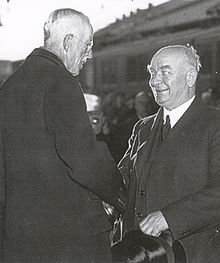Midsummer crisis
The Midsummer Crisis ( Swedish Midsommarkrisen ) was a political crisis in Sweden during the Second World War . At the beginning of Operation Barbarossa , on June 22, 1941, the German and Finnish sides requested the relocation of the 163rd Infantry Division from Norway via the territory of neutral Sweden to Finland , which was still neutral at the time .
The Swedish government and the Reichstag were divided on this issue. A significant part of the Social Democrats and some Liberals wanted to reject the request. The Social Democratic Prime Minister Per Albin Hansson got his party to agree to a compromise by giving the members of the Reichstag the impression that King Gustav V would abdicate if transit were refused. In this way, Hansson avoided the resignation of the then all-party government and a serious parliamentary crisis.
The division was promoted on the Swedish Railways from June 25th to July 12th . The Soviet Union responded to the impending German presence in Finland on June 25 with preventive air strikes on Finnish cities, whereupon Finland also actively intervened in the fighting. This began the so-called Continuation War .
The midsummer crisis became known to the public at the end of 1946. King Gustav V was assigned personal responsibility for the "German-friendly" policy of the war years. The king denied this in January 1947 to Hansson's successor, Tage Erlander . He had neither sought the resignation of the government nor threatened to abdicate.
literature
- Krister Wahlbäck, Göran Boberg: Sveriges sak är vår - 1939–1945 i document. Prisma, Stockholm 1966
Individual evidence
- ↑ Days Erlander: Dagböcker 1945–1949 edited by Sven Erlander. Gidlunds Verlag, Hedemora 2001, ISBN 91-7844-335-0 , page 157
- ↑ Days Erlander: Dagböcker 1945–1949 edited by Sven Erlander. Gidlunds Verlag, Hedemora 2001, ISBN 91-7844-335-0 , page 161
